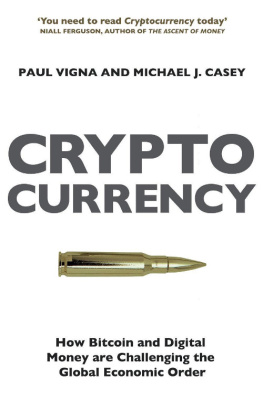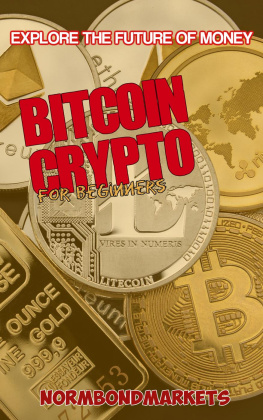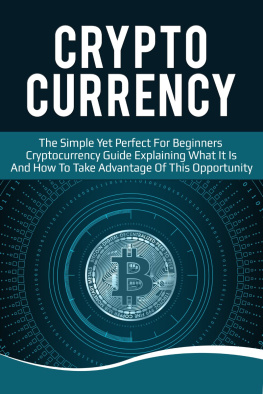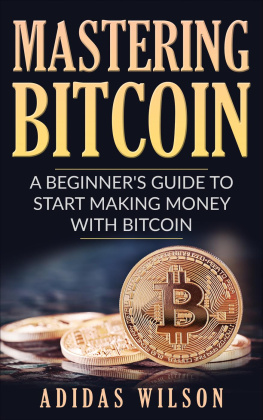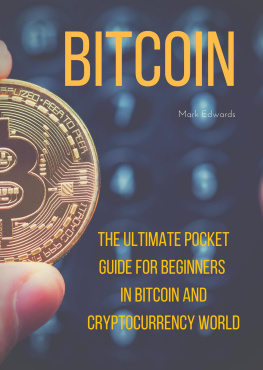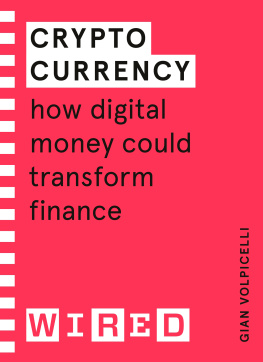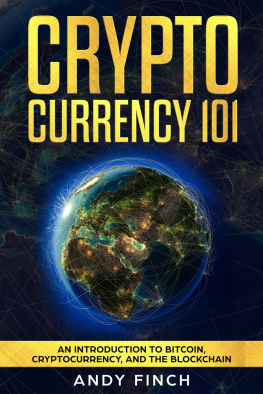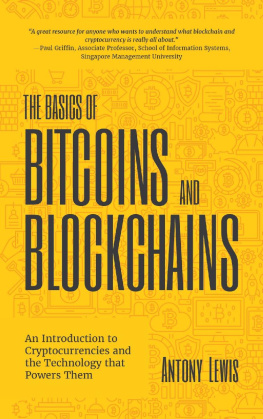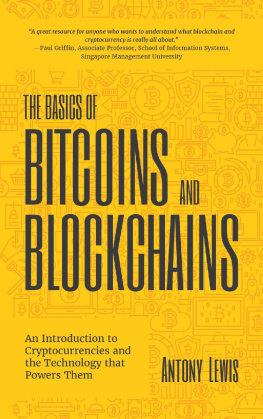The Age of Cryptocurrency
How Bitcoin and Digital Money Are Challenging the Global Economic Order
by
Michael J. Casey
2015
 ~ Scimus quae legis, et non dicimus ~
~ Scimus quae legis, et non dicimus ~ https://c3jemx2ube5v5zpg.onion
The Age of Cryptocurrency
How Bitcoin and Digital Money Are Challenging the Global Economic Order
Copyright 2015 Michael J. Casey
Language: English
Version: 1.0
Published by The Bodley Head 2015
Authors: Michael Casey & Paul Vigna
First published: 2015 by The Bodley Head, Random House
ISBN: 9781473521155 (EPUB), 9781847923448 (Hardback), 9781847923325 (Trade Paperback)
Bitcoin became a buzzword overnight. A cyber-enigma with an enthusiastic following, it pops up in headlines and fuels endless media debate. You can apparently use it to buy almost anything from coffee to cars, yet few people seem to truly understand what it is. This raises the question: Why should anyone care about Bitcoin?
In THE AGE OF CRYPTOCURRENCY, Wall Street journalists Paul Vigna and Michael J. Casey deliver the definitive answer to this question. Cybermoney is poised to launch a revolution, one that could entirely re-invent traditional financial and social structures while bringing the world's billions of "unbanked" individuals into a new global economy. Cryptocurrency represents the promise of a financial system without a middleman, one owned by the people who use it and one safeguarded from the devastation of a 2008-type crash.
But bitcoin, the most famous of the cybermonies, brings with it a reputation for instability, wild fluctuation, and illicit business; some fear it has the power to eliminate jobs and to upend the concept of a nation-state. It implies, above all, monumental and wide-reaching changefor better and for worse. But it is here to stay, and you ignore it at your peril.
Vigna and Casey demystify the concept of cryptocurrency, detailing its origins, its function, and what you need to know to navigate a cyber-economy. The digital currency world will look very different from the paper currency world; THE AGE OF CRYPTOCURRENCY will teach you how to be ready for it.
Contents
[]
Here in Afghanistan a womans life is limited by: Parisa Ahmadi, interviewed by Paul Vigna via e-mail, July 4 and 11, 2014.
[]
Francesco Rulli, aware of the difficulty faced by women like Ahmadi: Francesco Rulli, interviewed by Michael J. Casey and Paul Vigna, June 19, 2014.
[]
If you think about what a modern economy is all about: Lawrence Summers, phone interview by Michael J. Casey, April 30, 2014.
[]
the unbanked, the Parisa Ahmadis of the world: Asli Demirguc-Kunt and Leora Klapper, Measuring Financial Inclusion, World Bank Policy Research Working Paper 6025, April 2012.
[]
In some cases, bitcoin will refer to both the currency and the technology. But for convenience and consistency with the style at The Wall Street Journal, we stick with lowercase in all references. To a large extent, context will clarify the distinction being made.
[]
Every time I give a talk, I emphasize: Gavin Andresen, interviewed by Michael J. Casey, February 11, 2014.
[]
a terrible store of value: Jamie Dimon, interviewed on CNBC, January 23, 2014.
[]
investor Warren Buffett, who called it simply a mirage: Warren Buffett, interviewed on CNBC, March 14, 2014.
[]
Based on nominal Argentine GDP in pesos, converted into dollars at the going black-market rate in August 2014.
[]
In his recent and provocative book: Felix Martin, Money: The Unauthorized Biography (The Bodley Head, 2013).
[]
he declares that currency is not itself: Ibid., 14, 27.
[]
Martin takes us to the Micronesian island of Yap: Ibid., 38.
[]
This metallism viewpoint: Distinctions between metallism and chartalism informed by Stephanie Bell, The Hierarchy of Money (Jerome Levy Economics Institute of Bard College, April 1998).
[]
Aristotle, who wrote, When the inhabitants: B. J. Gordon, Aristotle, Schumpeter, and the Metallist Tradition, Quarterly Journal of Economics 75 (4) (1961): 60814.
[]
Adam Smith in The Wealth of Nations: See Martin, Money, 810.
[]
The anthropologist David Graeber hypothesizes: David Graeber, On the Invention of MoneyNotes on Sex, Adventure, Monomaniacal Sociopathy and the True Function of Economics, http://www.nakedcapitalism.com/2011/09/david-graeber-on-the-invention-of-money-%E2%80%93-notes-on-sex-adventure-monomaniacal-sociopathy-and-the-true-function-of-economics.html.
[]
Money, then, made human settlements less vulnerable: See Martin, Money, 5064.
[]
worsened by Emperor Diocletians flawed attempts at price controls: Robert L. Schuettinger and Eamonn F. Butler, Forty Centuries of Wage and Price Controls, chap. 2, excerpted by the Ludwig von Mises Institutes blog, http://mises.org/daily/3498.
[]
As the historian Niall Ferguson reminds us: See Niall Ferguson, The Ascent of Money (Penguin, 2008), 4249.
[]
Staters, the gold-and-silver-alloy coins: Robert J. OHara, Ancient Greek Coins of Miletus, posted on the Rjohara.net blog, http://rjohara.net/coins/lydia-electrum/.
[]
Chinese emperors were taking money into its next phase: See Martin, Money, 7681.
[]
They described it as a means to preserve wealth: Richard von Glahn, Fountain of Fortune: Money and Monetary Policy in China, 10001700 (University of California Press, 1996), p 29.
[]
The most impressive of these was the cu de marc: Marie-Thrse Boyer-Xambeau, Ghislain Deleplace, and Lucien Gillard, Private Money & Public Currencies: The 16th Century Challenge (M. E. Sharpe, 1994).
[]
This negotiation between the sovereign: Martin, Money, 11521.
[]
Based on the ideas of liberal thinkers: Ibid., 12236.
[]
Spearheaded by Walter Bagehot: Ibid., 196204.
[]
But in the end, the United States, as the only major power: See Ben Steil, The Battle of Bretton Woods: John Maynard Keynes, Harry Dexter White, and the Making of a New World Order (Princeton University Press, 2013).
[]
The true identity of this person, or even group of people, is a well-kept secret. For simplicitys sake, well refer throughout the book to the founder of bitcoin as a single male person and by the name chosen by that founder.
[]
Ive been working on a new electronic cash system: Satoshi Nakamoto, Bitcoin P2P e-Cash Paper, cryptography mailing list, October 31, 2008.
[]
We define an electronic coin as a chain of digital signatures: Ibid.
[]
People will not hold assets in this highly inflationary currency: Ray Dillinger, Bitcoin P2P e-Cash Paper, cryptography mailing list, November 6, 2008, http://www.metzdowd.com/pipermail/cryptography/2008-November/014822.html.
[]
Dillingers characterization of bitcoin as highly inflationary is the opposite of how it is generally now, more than six years later, described; because it is programmed with a hard-fixed, finite supply of bitcoins over time and a diminishing rate of issuance, its mainly thought of as a deflationary currency.
[]
to achieve the old Cypherpunk dream: James A. Donald, Secrets and Cell Phones, cryptography mailing list, November 5, 2008, https://www.mail-archive.com/cryptography@metzdowd.com/msg09969.html.

